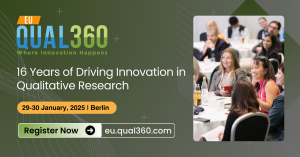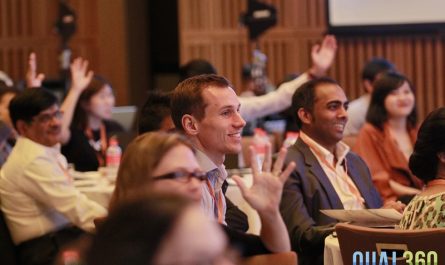Supercharged Innovation in the Insights Industry
Battle of the Titans: human versus machine
Thomas Troch, Global Client Partner at Human8
Annelies Verhaeghe, Head of Platform at Human8
The world of innovation is rapidly evolving, with traditional human-led processes now being augmented by advanced technologies like Generative AI (GenAI). For decades, innovation was driven by the domain expertise of professionals in marketing, engineering and design. This human-centric approach, while valuable, often faced limitations, such as idea saturation, cognitive biases and the tendency toward groupthink. Moreover, human creativity, though essential for innovation, often demands substantial time and effort.
In response, many companies began embracing external sources of innovation, such as crowdsourcing, lead user methods, and open innovation. By incorporating input from consumers, creators and external contributors, organisations were able to diversify their pool of ideas. Despite these advancements, most organizations still struggle to integrate external perspectives seamlessly into their in-house innovation practices, remaining reliant on internal expertise. However, with the rise of GenAI, the conversation has shifted once again. Can AI become a true partner in human-led innovation, or is it just another novelty?
GenAI in innovation: a new era or just a hype?
The growing interest in Generative AI (GenAI) in business has become a significant trend. The buzz has particularly impacted the insights and innovation industry, sparking discussions on whether GenAI offers mere novelty or if it can drive substantial, impactful results. The focus has predominantly been on how AI can streamline and automate processes. However, we wanted to investigate a different question: how can AI amplify human creativity, foster divergent thinking, and drive more human-centric innovation?
The answer is complex. GenAI offers several advantages in innovation, such as enhanced creativity, scalability, and objectivity in decision-making. Yet, it also comes with challenges, including biases in data, a tendency to generate average responses, and a need for precise prompt engineering.
Key advantages of incorporating GenAI in innovation:
- Enhanced creativity: GenAI excels in generating a wide variety of ideas, sometimes surpassing human creativity in specific contexts. Moreover, through the usage of visual AI, typical creative tasks like sketching and prototyping are increasingly becoming more accessible for people without a specific education in this domain.
- Scalability: Research has shown that individuals using AI for idea generation can produce a higher volume of ideas compared to those who do not utilise AI. GenAI rapidly accelerates idea generation, which allows companies to respond swiftly to market demands and emerging trends. Innovators can cherry-pick from a broader pool of ideas, ensuring that no opportunity goes unexplored.
- Objectivity: AI can assist in idea prioritisation, leveraging synthetic data to simulate how real people might think and react to different marketing stimuli. This approach could potentially replace human intuition and emotion in decision-making processes, driving forward ideas based on data-driven insights rather than subjective preferences.
Challenges and limitations:
- Data bias: AI models often inherit biases from their training data, which can lead to skewed outcomes. Moreover, AI systems can be prone to factual inaccuracies and confirmation bias. It is important to combine AI outputs with human oversight to mitigate this risk.
- Average responses: AI frequently generates “average” ideas that lack the breakthrough potential found in human ideation processes, especially from exceptionally creative individuals.
- Early stages of adoption: The application of GenAI in innovation (and beyond) is still developing. With the success of AI systems heavily depends on the quality of prompts.
The AI-human synergy: Balancing Human Intuition and AI Power
The true potential of AI lies in its synergy with human intuition. By combining AI’s data-driven capabilities with human creativity, teams can unlock new dimensions in problem framing, divergent thinking, and idea prioritization. We identified three pivotal areas where AI can complement human-led innovation:
- Problem framing: Using tools like our ‘Insight Reframing Canvas’, AI can help teams define the problem space more accurately, ensuring that the solutions developed are relevant and effective. This framework includes a series of AI-enabled techniques designed to refocus the understanding of research findings on the core friction points.
- Divergent thinking: AI’s ability to explore unconventional pathways allows for more disruptive and creative ideation. In tandem with creativity techniques, AI introduces valuable external perspectives that human teams may overlook, though it requires careful framing to stay aligned with brand goals.
- Idea prioritization: Ideation sessions typically generate hundreds of ideas. Screening all of these ideas with consumers is often not feasible or too costly. Synthetic data enables objective prioritization, simulating consumer feedback to various ideas or product concepts. This helps make more informed decisions about which ideas to advance, while still allowing for human intervention and judgment.
AI should not be seen as a replacement for human creativity but as a powerful collaborator. By blending AI’s data-driven insights with human intuition and contextual understanding, we can achieve superior outcomes. In fact, we found that the power is truly in the mix and that combining internal ideation, creative crowdsourcing and AI can unlock new levels of creativity and efficiency.
Meet Human8 in person at QUAL360 EU!
QUAL360 Europe brings together, once again, a unique mix of research professionals in a global conference series dedicated exclusively to qualitative market research in 2025. With more than 15 years of setting higher standards for the research industry, this edition presents the latest comprehensive methodologies and practices from leading experts at renowned international brands. This year, we’re once again gathering leading industry minds, including decision-makers from Lego Group, Capital.com, Nestlé, Philips, Booking.com, PepsiCo, BBC, and more!
The regular pass rate expires on December 31st — hurry and secure your spot today!










 by
by 


